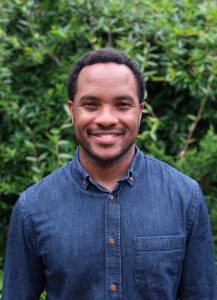
Armando Sanchez
University of St. Thomas
Houston (29.7° N, 95.3° W)
featuring Justin Gross, Product Manager, Capital One, Washington, D.C. (38.9° N, 77.0° W)
According to a study from Pew Research Center, 49% of American workers say they are very satisfied with their current job. How can someone become part of this statistic and find a career that aligns with their various personal interests?
Justin Gross is a product manager at Capital One. He graduated from Rice in 2015 with a bachelor of arts in Economics. I  was especially interested in interviewing him because my goal is to combine my interests in technology and finance into a career; something he has been able to do quite effectively. After I reached out to him, we were able to arrange a Google Meet for the interview.
was especially interested in interviewing him because my goal is to combine my interests in technology and finance into a career; something he has been able to do quite effectively. After I reached out to him, we were able to arrange a Google Meet for the interview.
At seven years old, Justin started running track, which he continued throughout his school years. He also did hurdles, long jumping, and multi events in track and field. This put him in a good position to enter college, where he became a decathlete at Rice University. Justin mentioned that his father encouraged him to gain a diverse skillset by doing as many different things as possible so that he could have more opportunities later in life.
Straight out of college, Justin got a job managing portfolios as an investment analyst at WMS Partners, LLC, an investment management company in Maryland. After working there for nearly a year, he decided it was not something he wanted to do long term. Justin identified this as a critical point in his life. He had to make the decision to leave a promising career to pursue something he had a passion for. He got a job at 2U, a software company that focuses on education. Justin entered the company as a financial analyst, but ultimately, he became a business intelligence analyst. Early in 2019, he left the company to start his current position at Capital One.
As a product manager, Justin is responsible for managing his team as they develop new software features and improvements to mobile apps. Developing secure, scalable applications is already a complicated process. The need to identify how each feature contributes to the product from a business perspective makes development even more difficult. This is where Justin comes in. He must manage this process from a business perspective, keeping the company’s bottom line in mind. Software development can get expensive extremely fast; thus, it becomes necessary to identify the essential features to be prioritized. He must also know the risks associated with adding each new feature. Finally, he must break up work and keep his team organized so that they can bring new features to the market within a reasonable amount of time. On a daily basis, he meets with the tech team to define acceptance criteria to determine when a screen is complete according to their standards. Justin says that knowing how to code is not considered essential to his position, but having some knowledge gives him a better insight into the development process. He completed an iOS development bootcamp to have a better understanding of what the development process is like from a coder’s perspective.
When I asked Justin about entrepreneurship, he seemed quite enthusiastic about the idea. He suggested that working many different positions in the span of five years has allowed him to learn many different aspects of running a business. Every experience he has had working for these companies will enable him to be better prepared if he does start his own business. Justin also expressed caution towards entrepreneurship that focused on monetary gain. Ultimately, your ability to succeed comes down to the product or service that you offer and its ability to benefit the consumer.
In many ways, entrepreneurship can be a great answer to the question I originally posed. Instead of finding a job that fits, you create your own. The risks of starting one’s own business cannot be overstated, but if one is successful in finding an entry into an increasingly competitive market, it can be extremely rewarding. Though this oversimplifies the process, I think it explains why so many people are eager to be entrepreneurs. By using skills acquired from working different jobs, an entrepreneur is able to bring a new perspective and add value to the world through their work.
Highlights from the interview:
Family, traditions, environment we grow up in, and circumstances impact our development as a person and choices we make. What were your parents’ expectations of you?
Both my parents were first in their families to attend college, and they’re both math majors. My parents had different expectations of me. My mom being a straight A student expected straight A’s, but what fueled me more aligns with my dad’s expectations of me. He would always tell me that he doesn’t really care about my grades; he cares about the effort. If the effort is there, the grades will improve. No matter what you have an interest in, do it at 110%. That is the mentality that I try to approach everything with; I continue to find new things to get involved in. You’re always at your best when you have options and diversify your skill set, but make sure you do all of them with a lot of effort.
What kinds of skills? Career-related or something else?
I grew up running track. I have started at the age of seven as a middle-distance runner, and then I got into the hurdles, long jumping, and doing multi events. That put me in a good position to get a scholarship to go to college. What my dad taught me at a young age was that the more things you can do and do well, the more options/the more opportunities you will have. This mindset put me in a good position to go to Rice.
At Rice, I was an economics major, which allowed me to pivot into various directions. I started my career off as an investment analyst and a trader, and then moved over to corporate finance. Then I worked in customer insights and strategy in marketing and finance [departments] at an EdTech company, where I also did data science. I’ve been working professionally for five years with one and a half being at Capital One. I partner with an Android and iOS team to deliver on our strategic roadmap while performing data analysis on our products at a major financial services company. I’ve also worked in investment management, corporate finance, marketing, and data science prior to my current role in product management. This variability resonates with what was expected of me as a young kid; get involved in as many things as possible and do well in those things and that’ll set you up to have options. In my early career, I learned a lot of different skills. Now I can kind of pick and choose where I want to go [in the future].
Your current position involves working with the development team to what extent? How much coding do you do? What is the relationship of your position with the development side of things?
At Capital One, I mostly work on the business side; I work in fraud and disputes. We want to make digital services available to our customers, but we also want to ensure that we’re providing the right information that we’re protecting against risks. We take the business intent, package it, and go to our partner teams. We ask the following questions. How can we break this down into small units of work? When will we be able to go to the market with it? What are some of the challenges, what are some of the requirements? Do we need more information? Do we have to partner with another team? What are the risks associated with it? On a daily basis, I meet with the tech teams; we groom stories and define acceptance criteria. The more coding you know, the better off you’ll be, but it’s not a requirement to be successful. At my last job, I worked on data science and from the development standpoint, it helped me speak the language, but I also completed an iOS development bootcamp that has furthered my knowledge in that area. Now when I’m talking about the business intent, I can act as a middleman and try to get things out to the market more effectively.
Did you have a significant failure at any point in your path? And how did you resolve that?
Probably six months into my first job, I realized it wasn’t what I wanted to do and it threw me for a loop. I asked myself, “how do I put myself in a position to have a fulfilling career?”. Sometimes you may have to move sideways or backwards to get to the right place. I wouldn’t consider it a failure, but it definitely realigned me and re-centered me in terms of motivation and future plans.
Do you have any interest in entrepreneurship, working for yourself?
Yes, definitely. If you can identify something that you’re passionate about and if you can find customers whose lives you can improve in some material way, you can use it as an input to a business idea. At this juncture, I’m just working through ideas, but I haven’t gotten to the point where I feel like it’s time to take it to the next level. It’s key to ensure that you’re doing it for the right reasons because there’s a lot of risk that comes with it.
What advice would you give students who look for a career? What type of jobs should they pursue especially straight out of college?
Figure out two things you can do at the same time; one of them will likely be your full-time job and the other one will be a personal passion. But that doesn’t mean that you can’t continue to feed those interests at the same time. Ultimately, what experience do you think would be most beneficial to you? You can’t go wrong if you’re truly interested in either one of those two. As long as you have the talent and skills, you’ll be able to get a role, especially within the software development field. Decide the type of company you want to work at, the type of role you want to have, and figure out what you want to do on a daily basis .
Interview excerpts have been lightly edited for clarity and readability and approved by the interviewee. This article only aims to share personal opinions and learnings and does not constitute the interviewee’s current or former employer(s)’ position on any of the topics discussed.
